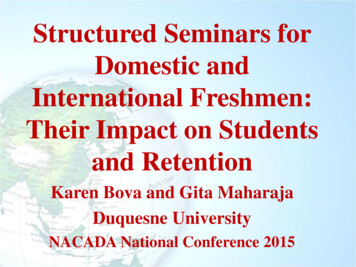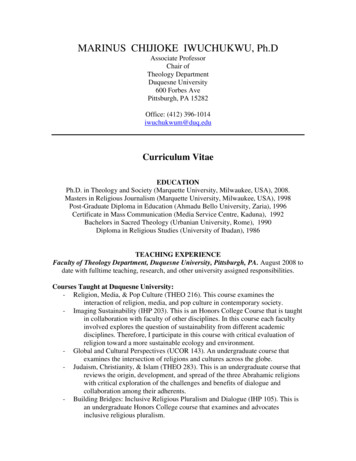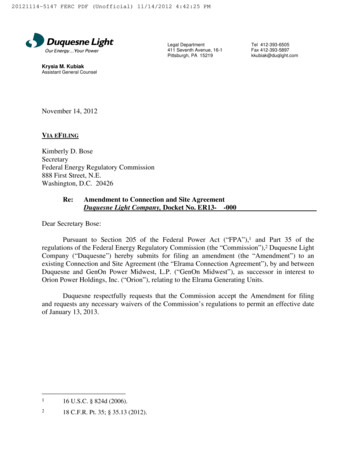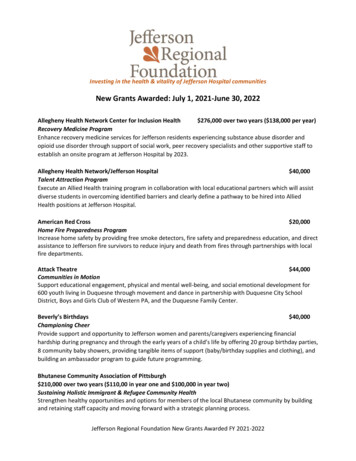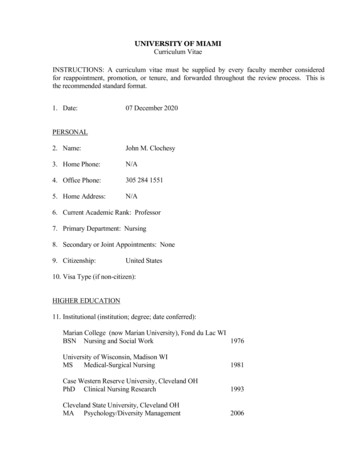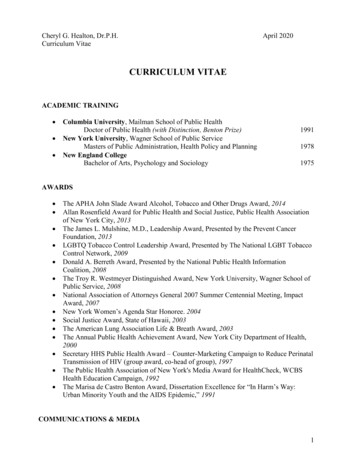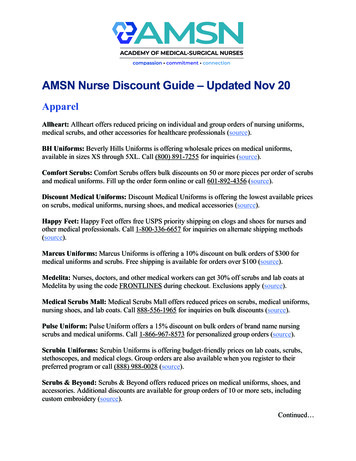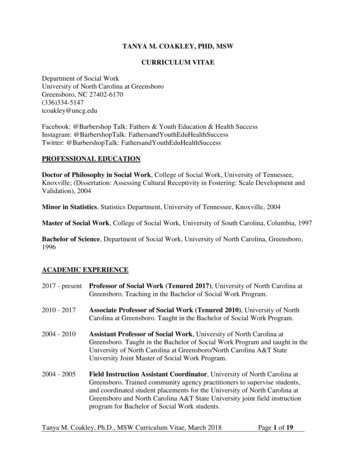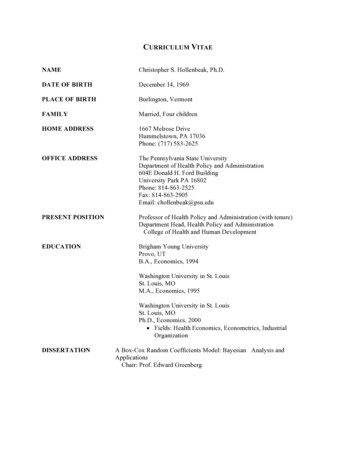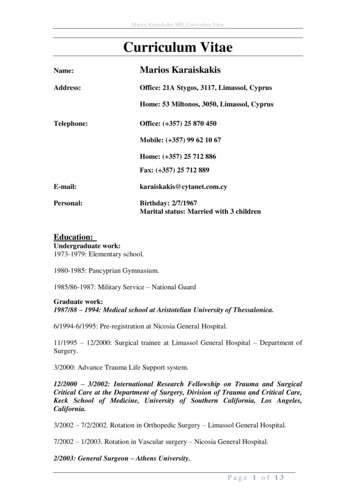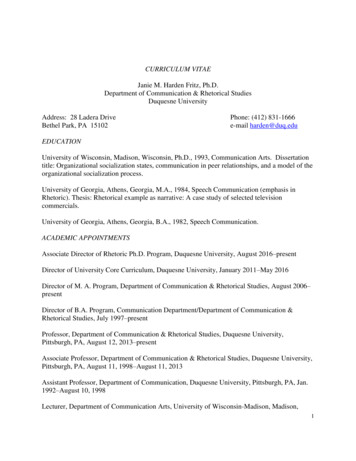
Transcription
CURRICULUM VITAEJanie M. Harden Fritz, Ph.D.Department of Communication & Rhetorical StudiesDuquesne UniversityAddress: 28 Ladera DriveBethel Park, PA 15102Phone: (412) 831-1666e-mail harden@duq.eduEDUCATIONUniversity of Wisconsin, Madison, Wisconsin, Ph.D., 1993, Communication Arts. Dissertationtitle: Organizational socialization states, communication in peer relationships, and a model of theorganizational socialization process.University of Georgia, Athens, Georgia, M.A., 1984, Speech Communication (emphasis inRhetoric). Thesis: Rhetorical example as narrative: A case study of selected televisioncommercials.University of Georgia, Athens, Georgia, B.A., 1982, Speech Communication.ACADEMIC APPOINTMENTSAssociate Director of Rhetoric Ph.D. Program, Duquesne University, August 2016–presentDirector of University Core Curriculum, Duquesne University, January 2011–May 2016Director of M. A. Program, Department of Communication & Rhetorical Studies, August 2006–presentDirector of B.A. Program, Communication Department/Department of Communication &Rhetorical Studies, July 1997–presentProfessor, Department of Communication & Rhetorical Studies, Duquesne University,Pittsburgh, PA, August 12, 2013–presentAssociate Professor, Department of Communication & Rhetorical Studies, Duquesne University,Pittsburgh, PA, August 11, 1998–August 11, 2013Assistant Professor, Department of Communication, Duquesne University, Pittsburgh, PA, Jan.1992–August 10, 1998Lecturer, Department of Communication Arts, University of Wisconsin-Madison, Madison,1
Wisconsin, August 1991–December 1991Teaching Assistant, University of Wisconsin-Madison, Madison, Wisconsin, August 1984–July1991Adjunct faculty, College of St. Francis, Joliet, Illinois, Fall, 1989 (Madison satellite)Workshop Presenter, University of Wisconsin Extension Program CommunicationFall 1988–Spring 1990Teaching Assistant, University of Georgia, Athens, Georgia, August 1982–May 1984PROFESSIONAL MEMBERSHIPSPennsylvania Communication AssociationEastern Communication AssociationSouthern States Communication AssociationReligious Communication AssociationNational Communication AssociationInternational Communication AssociationAssociation for Business CommunicationInternational Leadership AssociationAssociation of Leadership EducatorsFellowship of Catholic ScholarsChristianity and Communication Studies NetworkAWARDS AND HONORS(2018) National Communication Association: Honored as Outstanding Teacher in DedicatedSession(2017) National Communication Association Communication Ethics Division Teacher of theYear Award(2015) Omicron Delta Kappa Teacher of the Year(2014) Distinguished Research Fellow, Eastern Communication Association(2014) Everett Lee Hunt Award, Eastern Communication Association, for Professional Civility:Communicative Virtue at Work (2013, Peter Lang)(2013) Clifford G. Christians Ethics Research Award, Carl Couch Center for Social and InternetResearch, for Professional Civility: Communicative Virtue at Work (2013, Peter Lang)2
(2012) Robert & Patricia Gussin Spiritan Division of Academic Programs Outstanding FacultyAward(2012) Distinguished Teaching Fellow, Eastern Communication Association(2011) Donald Eckroyd Award for Scholarly Excellence, Pennsylvania CommunicationAssociation(2011) National States Advisory Council Scholar of the Year Award(2010) Presidential Award for Excellence in Service to the Mission, Duquesne University(2010) McAnulty College and Graduate School Faculty Award for Service, Duquesne University(2010) Elected to Phi Kappa Phi Honor Society, Duquesne University(2009) Harvey Kelly Award for Teaching Excellence, Pennsylvania Communication Association(2009) Presidential Award for Excellence in Teaching, Duquesne University(2009) McAnulty College and Graduate School Faculty Award for Teaching Excellence,Duquesne University(2007) Eugene P. Beard Award for Leadership in Ethics, Duquesne University(2006) Carroll Arnold Distinguished Service Award, Pennsylvania Communication Association(2004) Top paper panel in the Religious Communication Studies Division of the ReligiousCommunication Association (with Eric Grabowsky) for paper titled “The Internship:Praxis Education in the Catholic Tradition”(1986) Top student paper award in the Interpersonal Communication Division of theInternational Communication Association for paper titled “Response Differences toIntimate Disclosures”(1983) University-Wide Assistantship, University of Georgia,Athens, Georgia(1982) Phi Beta Kappa (University of Georgia)(1979) National Merit Scholarship3
TEACHINGCourses taughtDuquesne University Department of Communication/ Department of Communication &Rhetorical Studies (Jan. 1992–present)Rhetoric & Philosophy of Intercultural Communication (Ph.D. seminar)Rhetoric & Philosophy of Organizational and Leadership Communication (Ph.D. Seminar)Exploring Leadership Communication (undergraduate students)Communication and Professional Civility (health communication/communication ethics class forphysician assistant students)Seminar in Intercultural, Interpersonal, and Interreligious Dialogue (Integrated Honors Program)Exploring Interpersonal Communication (undergraduate; University Core Theme Area SocialJustice; both online and face-to-face sections)Exploring Intercultural Communication (undergraduate; both online and face-to-face sections;University Core Theme Area Global Diversity)Communication and Gender (MA/undergraduate)Communication Ethics and Professional Civility (MA students)Health Care Communication Ethics (graduate; face-to-face and hybrid—face to face combinedwith on-line—versions)Organizational Communication (MA/undergraduate)Organizational Communication (on-line course, School of Leadership and ProfessionalAdvancement program)Organizational Communication for Leaders (Masters of Leadership and Liberal Studies [MLLS]students, face-to-face and on-line sections, School of Leadership and Professional Advancement)Organizational Communication for Sports Leadership (MLLS students, face-to-face and on-linecourse, School of Leadership and Professional Advancement program)Leading Across Cultures: International Communication (Master of Science in Global Leadership[MSGL] students, on-line course, School of Leadership and Professional Advancement program)Rhetoric and Philosophy of Organizational Communication (PhD/MA students)Philosophy of Interpersonal Communication (PhD/MA students)Communication Ethics (undergraduate students, Saturday College program, face-to-face and online versions)Interpersonal Communication and Leadership (MLLS students, School of Leadership andProfessional Advancement program)Communication Management (undergraduate adult students in School of Leadership andProfessional Advancement program)Theory and Practice of Group Discussion (graduate/undergraduate)Communication Research Methods/Communication Research and Evidence(graduate/undergraduate)Theory and Practice of Interpersonal Communication (graduate/undergraduate; also in School ofLeadership and Professional Advancement program)4
Theory and Practice of Organizational Communication (graduate/undergraduate)Human Communication and Society (undergraduate)Intercultural Communication (graduate/undergraduate)Cultural Perspectives: Intercultural Communication (Integrated Honors Program)Public Speaking (undergraduate)Public Speaking (undergraduate; Robert and Patricia Gussin Spiritan Division program)Introduction to Interpersonal Communication (undergraduate)Introduction to Intercultural Communication (undergraduate; Robert and Patricia Gussin SpiritanDivision of Academic Programs)University of Wisconsin Department of Communication Arts (Aug. 1984–Dec. 1991) (allundergraduate)Introduction to Public SpeakingFundamentals of Public SpeakingInformative Speaking (Module course)Theory and Practice of Small Group Discussion (Teaching Assistant and independent sections)Theory and Practice of Persuasion (Teaching Assistant)Communication and Human BehaviorIntroduction to Interpersonal Communication (Teaching Assistant)College of St. Francis (Joliet, Illinois; adjunct faculty position in Madison, Wisconsin, Fall 1989)Interpersonal Communication (adult undergraduate students)University of Wisconsin Extension Communication ProgramWorkshops (Fall 1988–Spring 1990; adult employees of area businesses)Improving Peer Relations on the JobInterpersonal CommunicationSelf-Concept, Self-Esteem, and CommunicationFarm and Industry Short Course Program, University of Wisconsin-MadisonPublic Speaking (Spring, 1991) (undergraduates)University of Georgia Speech Communication Department (Aug. 1982–May 1984)Public Speaking (undergraduates)ACADEMIC ADVISEMENTUndergraduate advisees: 180Graduate advisees: 32 M.A. students; 45 Ph.D. students (general advising)Ph. D. Dissertations Directed: CompleteRachel S. W. Kaplan—Spring 2017—completed Spring 20185
Tricia Giannone McFadden—Spring 2017—completed Fall 2017Karen Fetter—Spring 2016–competed Fall 2017Johan Bodaski—Spring 2016—completed Summer 2018 [graduation December 2018]Joshua Hill—Spring 2015—completed Fall 2016Richard Talbert—Fall 2014—completed Spring 2016Fr. Maximillian Ofori—Fall 2014—completed Spring 2016Jennifer Jones—Fall 2012—completed Spring 2014Bonnie Reese—Fall 2010–completed Fall 2012Georgia Bedford—Fall 2009—completed Summer 2012Catherine Fitzwilliams—Fall 2008—completed Summer 2009Joe DeCrosta—Spring 2007—completed Spring 2014Leeanne M. Bell—Spring 2006—completed Spring 2007Eric Grabowsky—Spring 2005–completed Fall 2010Susan Kapusta—Spring 2005—completed Fall 2006Danielle Blackburn—Spring 2004–completed Spring 2010Colleen Burke Deisler—Spring 2004—completed Summer 2005Maria Davidson—Spring 2004—completed Spring 2006Linda Janus—Spring 2004–completed Fall 2009Richard Mills—Spring 2004—completed Summer 2006Nancy Mills—Spring 2004–completed Summer 2006Laurie Moroco—Spring 2004–completed Fall 2005Elesha Ruminski (co-directed)—Spring 2004—completed Summer 2006Fr. John Amankwah—Spring 2002—completed Spring 2005Fr. Andre Quenum—Spring 2002—successful defense Summer 2004; completed degree2007Steve Urbanski (co-directed)—Spring 2002—completed Spring 2004Ph. D. Dissertations Directed : In ProgressFr. Ayub Mwampela—Spring 2018–present—activeMatthew Mancino—Spring 2018–present—activeFr. Felix Okeke—Fall 2016–present—activeTimothy Michaels—Spring 2016–present—activeLoubna El Abbadi—Spring 2015–present—activeMonale Alemika—Fall 2013–present—took M.A.Dila Erdogdu—Fall 2012–present—activeRandy Rossi—Spring 2010–present—inactiveD. H.C. E. Projects DirectedFr. Ben Faneye—Spring 2004—completed Spring 2004Ph.D. Dissertations (Committee Member)Autumn Redcross—Fall 2017–present—activeMaha Alshoaibi—Spring 2017–present—active6
Susan Mancino—Spring 2016—completed Spring 2018Sarah (Flinko) DeIuliis—Spring 2016—completed Spring 2018Hannah Cherico— Spring 2016—completed Spring 2018Alexander Regina—Spring 2016—completed Fall 2017Joshua Friedberg—Spring 2016–present—activeRobert Foschia—Spring 2016—completed Fall 2018Allison Raemore Peiritsch—Spring 2015—completed Spring 2016David DeIuliis—Fall 2014—completed Fall 2015Matthew Fazio—Fall 2014—completed Spring 2016Jeff Lohr—Spring 2014—completed Fall 2018Julie Hunsberger—Spring 2014—completed Fall 2016Kristen Jenkins Hark—Fall 2013—completed Fall 2014Nicholas Pertler—Fall 2013—completed Fall 2014Nancy L. McNeal—Summer 2012—completed Fall 2016 (Ed.D. degree; I was asked toserve on her committee)Brian Gilchrist—Spring 2012–completed Spring 2013David Stern–Fall 2012–did not complete—received M.A. degree Fall 2017Natalie Gigliotti—Fall 2012—completed Fall 2018Beth Walter—Spring 2012—completed Spring 2014Randy Cole—Spring 2012—completed Spring 2013Jill Seibert Burk—Spring 2011—completed Spring 2014Joel Ward—Spring 2011–present—completed Fall 2014Anthony Wachs—Spring 2011—completed Spring 2012Celeste Grayson Seymour—Spring 2011—completed Summer 2012Kenneth Bohl—Spring 2011—completed Spring 2012Jennifer Brunner—Fall 2011—completed Spring 2012Paul Lucas—Fall 2011—completed Summer 2012Jill Dishart Leontiadis—Fall 2010—completed Fall 2014Linda Coleman—Spring 2009—completed Spring 2011Mandy Dlugos—Spring 2009—completed Summer 2015Cyril Latzoo—Spring 2009–present—inactiveJeremy Langett—Spring 2009—completed Spring 2010Stephanie Selker—Spring 2009—completed Spring 2011Dorene Ciletti—Spring 2007—completed Summer 2009Fendrich Clark—Spring 2007—completed Spring 2009Rachel Kosko—Spring 2007—completed Summer 2015Fadouah Loudiy—Spring 2007—completed Fall 2010Craig Maier—Spring 2007—completed Summer 2008Marilyn Gilreath—Spring 2006–present—inactiveSteve Kriss—Spring 2006–completed Spring 2016Denise Murphy-Gerber—Spring 2006—completed Summer 2012Reshme Sen—Spring 2006—completed Fall 2007Brent Sleasman—Spring 2006—completed Fall 20077
Casey Slott—Spring 2006—completed Spring 2010Cory Williams—Spring 2006–Fall 2007—completed Fall 2007Ed Arke—Spring 2004—completed Summer 2005 (School of Education: IDPEL/ILEADprogram; this student requested that I be on his committee)Marie Baker-Ohler—Spring 2004—completed Summer 2005Fr. Cornelius Chux—Spring 2004–completed Summer 2006S. Alyssa Groom—Spring 2004–completed Spring 2005Junya Hirano—Spring 2004–present—inactiveFr. Anthony Naaeke—Spring 2004—completed Fall 2004Frank Rybicki—Spring 2004–Summer 2004—completed Summer 2004Lynda Schaaf—Spring 2004—completed Summer 2005Fr. (Augustine) Tae Woo—Spring 2004—completed Summer 2008M.A. ThesesFall/Spring, 2000: Director, Masters Thesis, Siegmund FuchsSpring, 1999: Director, Masters Thesis, Steve KrissSpring, 1999: Director, Masters Thesis, Alyssa RitzSpring, 1999: Director, Masters Thesis, Nancy MillsSpring, 1997: Served on Masters Thesis committee for Gayla VanDenBoscheSpring, 1995: Served on Masters Thesis committee for Carole GilardiSpring, 1994/Summer, 1994: Served on Masters Thesis committee for Tom KoenigFall, 1993 - Spring, 1995: Served on Masters Thesis committee for Patricia JurczakSCHOLARSHIPScholarly BookFritz, J. M. H. (2013). Professional civility: Communicative virtue at work. New York: PeterLang.Edited Scholarly BooksOmdahl, B. L., & Fritz, J. M. H. (Eds.) (2012). Problematic relationships in the workplace,volume 2. New York: Peter Lang.Groom, S. A., & Fritz, J. M. H. (2012). Communication ethics and crisis: Negotiatingdifferences in public and private spheres. Madison, NJ: Fairleigh Dickinson University Press.Fritz, J. M. H., & Omdahl, B. L. (Eds.) (2006). Problematic relationships in the workplace.New York: Peter Lang.Refereed Scholarly Articles (Non-pedagogical)8
Longman, K. A., Daniels, J., O'Connor, C. M., Wikkerink, R. J., Dahlvig, J. E., & Fritz, J. M. H.(2015). Gendered definitions and self-perceptions of leadership in Christian higher education:The centrality of relationships, authenticity, and communicative influence. Journal ofCommunication and Religion, 38(2), 20–41.Maier, C. T., O'Neil, N. B., & Fritz, J. M. H. (2014). Who reads Catholic newspapers?:Exploring readership in a changing industry. Journal of Media and Religion, 13(3), 153–169.Fritz, J. M. H. (2014). Researching workplace relationships: What can we learn from qualitativeorganizational studies? Journal of Social and Personal Relationships, 31, 460–466.Fritz, J. M. H., O’Neil, N. B., Popp, A. M., Williams, C. D., & Arnett, R. C. (2013). Theinfluence of supervisory behavioral integrity on intent to comply with organizational ethicalstandards and organizational commitment. Journal of Business Ethics, 114, 251–263.Woods, R. H., Badzinski, D. M., Fritz, J. M. H., & Yeates, S. E. (2012). The “ideal professor”and gender effects in Christian higher education. Christian Higher Education, 11, 158–176.Arnett, R. C., Bell, L. M., & Fritz, J. M. H. (2010). Dialogic learning as first principle incommunication ethics. Atlantic Journal of Communication, 18, 111–126.Arnett, R. C., Fritz, J. H., & Holba, A. (2007). The rhetorical turn to Otherness:Otherwise than humanism. Cosmos and History: The Journal of Natural and Social Philosophy,3, 115–133.Fritz, J. M. H. (2002). How do I dislike thee? Let me count the ways: Constructing impressionsof troublesome others at work. Management Communication Quarterly, 15, 410–438.Cini, M., & Fritz, J. M. H. (2002). Leadership development in adult learners. Journal ofLeadership Research, 4.http://www.leadershipstudies.org/journal/Volume 4 Dec 2002/leadership development in adult.htmArnett, R. C., & Fritz, J. M. H. (1999). Departmental excellence: Constituencies in tension.Journal of the Association for Communication Administration, 28, 19–26.Fritz, J. M. H., Arnett, R. C., & Conkel, M. (1999). Organizational ethical standards andorganizational commitment. Journal of Business Ethics, 20, 289–299.Fritz, J. (1997). Curricular fidelity, diversity with connection: The Duquesne experiment.Journal of the Association for Communication Administration, 26, 24–31.9
Fritz, J. H. (1997). Men's and women's organizational peer relationships: A comparison. Journalof Business Communication, 34, 27–46.Fritz, J. M. H. (1997). Responses to unpleasant work relationships. Communication ResearchReports, 14, 302–311.Cini, M., & Fritz, J. (1997). Predicting commitment in adult and traditional-age students:Applying Rusbult’s investment model to the study of retention. Journal of Public Managementand Social Policy, 3, 66–76.Fritz, J. (1995). Feminist perspectives, structuration theory, and compliance gaining: Anexploratory integration. Speaker and Gavel, 32, 38–54.Boiarsky, G., & Fritz, J. (1995). Television and values socialization: A symbolic interactionistperspective. Journal of Mediated Communication, 10, 1–28.Fritz, J. H. (1994). Responses to intimate disclosures: Motivational differences of high and lowself-monitors. Journal of Mediated Communication, 9(3), 17–34.Dillard, J. P., Segrin, C., & Harden, J. M. (1989). Primary and secondary goals in the productionof interpersonal influence messages. Communication Monographs, 56, 19–38.Scholarly Book Chapters (Invited and Refereed)Fritz, J. M. H. (under review). Alasdair MacIntyre and communication. In R. Beadle & G. Moore(eds.), Learning from MacIntyre. Wipf & Stock.Fritz, J. M. H. (in press). Honesty as ethical communicative practice: A framework for analysis.In C. B. Miller & R. West (Eds.), Integrity, honesty, and truth-seeking. New York: OxfordUniversity Press.Fritz, J. H. (2019). Communication ethics and bullying. In R. West & C. S. Beck (Eds.), TheRoutledge handbook of communication and bullying (pp. 22–29). New York: Taylor & Francis.Fritz, J. M. H. (2018). John Henry Newman (1801–1890): Persuading through a holistic rhetoricof belief. In R. H. Woods & N. K. Wood (Eds.), Words and witnesses: Communication studiesin Christian throught from Athanasius to Desmond Tutu (pp. 163–169).Fritz, J. M. H. (2018). Communication ethics. In N. Snow (Ed.), Oxford handbook of virtue (pp.700–721). New York: Oxford University Press.Fritz, J. M. H. (2014). Organization as Other: Professional civility as communicative care forinstitutions. In R. C. Arnett & P. Arneson (Eds.), Philosophy of communication ethics: Alterity10
and the Other (pp. 215–231). Madison, NJ: Fairleigh Dickinson University Press.Fritz, J. M. H. (2014). Professional civility: Creating a culture of leadership. In C. B. Illés, A.Dunay, & A. Słocińska (Eds.), New Trends in Management in the 21st Century (pp. 237–244).Częstochowa, Poland: Czestochowa University of Technology.Fritz, J. M. H. (2014). Organizational misbehavior. In L. M. Crothers & J. Lipinski (Eds.),Bullying in the workplace: Symptoms, causes and remedies (pp. 3–16). New York:Routledge/Taylor & Francis.Fritz, J. M. H. (2013). Ethics matters: Why ethical communication makes a difference in today’sworkplace. In J. Wrench (Ed.), Workplace communication for the 21st century: Tools andstrategies that impact the bottom line (pp. 39–60). Santa Barbara, CA: Praeger.Fritz, J. M. H. (2013). A prophecy fulfilled: George MacDonald and Evangelical popular culture.In R. Woods (Ed.), Evangelicals and popular culture. (pp. 36–53). Santa Barbara, CA: Praeger.Fritz, J. M. H. (2012). Inspiration and motivation: If that reality star can do it, so can I. In W.Wyatt & K. Bunton (Eds.), The ethics of reality TV: A philosophical examination (pp. 93–109).New York: Continuum.Fritz, J. M. H. (2012). Women’s communicative leadership in higher education. In Ruminski, E.,& A. Holba (Eds.), Communicative understandings of women's leadership development: Fromceilings of glass to labyrinth paths (pp. 9–35). Lanham, MD: Lexington Books.Fritz, J. M. H. (2009). Rudeness and incivility in the workplace. In Wright, S., & Morrison, R.(Eds.), Friends and enemies in organizations: A work psychology perspective (pp. 168–194).Hampshire, UK: Palgrave-Macmillan.Arnett, R. C., & Fritz, J. M. H. (2003). Sustaining institutional ethos and integrity: Managementin a postmodern moment. In Iltis, A. S. (Ed.), Institutional integrity in health care (pp. 41–71).Dordrecht: Kluwer.Scholarly Book Chapters (Contributed)Fritz, J. M. H. (2012). Protecting and promoting workplace relationships: Professional civility. InB. L. Omdahl & J. M. H. Fritz (Eds.), Problematic relationships in the workplace, volume 2 (pp.257–266). New York: Peter Lang.Fritz, J. M. H. (2012). A review of concepts relevant to problematic relationships in theworkplace. In B. L. Omdahl & J. M. H. Fritz (Eds.), Problematic relationships in the workplace,volume 2 (pp. 3–17). New York: Peter Lang.11
Groom, S. A., & Fritz, J. M. H. (2012). Introduction. In S. A. Groom & J. M. H. Fritz (Eds.),Communication ethics and crisis: Negotiating differences in public and private spheres (pp. 1–8). Madison, NJ: Fairleigh Dickinson University Press.Fritz, J. M. H. (2012). Interpersonal crisis communication in the workplace: Professional civilityas ethical response to problematic interactions. In S. A. Groom & J. M. H. Fritz (Eds.),Communication ethics and crisis: Negotiating differences in public and private spheres (pp. 67–86). Madison, NJ: Fairleigh Dickinson University Press.Fritz, J. M. H. (2006). Typology of troublesome others at work: A follow-up investigation. In J.M. H. Fritz & B. L. Omdahl (Eds.), Problematic relationships in the workplace (pp. 21–46).New York: Peter Lang.Fritz, J. M. H., & Omdahl, B. L. (2006). Reduced job satisfaction, diminished commitment, andworkplace cynicism as outcomes of negative work relationships. In J. M. H. Fritz & B. L.Omdahl (Eds.), Problematic relationships in the workplace (pp. 131–151). New York: PeterLang.Hess, J. A., Omdahl, B. L., & Fritz, J. M. H. (2006). Turning points in relationships with dislikedcoworkers. In J. M. H. Fritz & B. L. Omdahl (Eds.), Problematic relationships in the workplace(pp. 89–106). New York: Peter Lang.Omdahl, B. L., & Fritz, J. M. H. (2006). Effects of negative interpersonal relationships on stressand well being. In J. M. H. Fritz & B. L. Omdahl (Eds.), Problematic relationships in theworkplace (pp. 109–130). New York: Peter Lang.Omdahl, B. L., & Fritz, J. M. H. (2006). Introduction. In J. M. H. Fritz & B. L. Omdahl (Eds.),Problematic relationships in the workplace (pp. xiii–xxi). New York: Peter Lang.Foreword to Scholarly BookFritz, J. M. H. (2007). Foreword. In Amankwah, J., Dialogue: The Church and the voice of theother (pp. ix–xiv). Berlin: Peter Lang.Invited Scholarly ArticlesFritz, J. M. H. (2017). The Catholic intellectual tradition, history, and institutions: Reflections onintersections. Journal of Communication and Religion, 40, 72–86.Fritz, J. M. H. (2016). Leadership, Levinas, and professional civility: A response to Jones.Leadership and the Humanities 4(1), 48–51.Fritz, J. M. H. (2015). Fr. Vincent Donovan: A Spiritan for today. Spiritan Horizons, 10, 75–86.12
Fritz, J. M. H. (2012). Infusing the curriculum: The Spiritan collection as institutional resource.Spiritan Horizons, 7, 67–74.Fritz, J. M. H., Bodenman, J. R., Jabro, A., & Mino, M. (2008). Herman Cohen’s legacy.Pennsylvania Scholars Series: Herman Cohen, 44–56.Fritz, J. M. H., & Sawicki, J. (2006). A framework for a Spiritan university. Spiritan Horizons, 1,53–68.Fritz, J. M. H., & Roberts, K. G. (2006). Service learning in a new key: Service literacy asconstitutive of praxis, identity, and community. Communication Annual, LXII, 5–21.Fritz, J. M. H. (2005). Contributions of Gerald M. Phillips to interpersonal communication.Pennsylvania Scholars Series: Gerald M. Phillips, 27–49.Fritz, J. M. H., Arnett, R. C., Ritter, D., & Ferrara, R. (2005). Moving forward, looking back:The specialist/generalist model as disciplinary guide for the 21st century. CommunicationAnnual, LXI, 1–13.Fritz, J. H., Chapin, J., Gabrich, C., & Streiff, J. A. (2003). Reaching out to the historicalmoment/reaching in to the legacy of the past: Engaging change and continuity as thePennsylvania Communication Association moves into the 21st century. PennsylvaniaCommunication Annual, LVIII/LIX, 1–14.Contributed Scholarly ArticlesFritz, J. M. H. (2010). Robert T. Oliver, standard bearer of the field of communication.Pennsylvania Scholars V: Robert T. Oliver, pp. 66–76.Fritz, J. M. H., & Burk, J. S. (2010). Introduction. Pennsylvania Scholars V: Robert T. Oliver,pp. 4–6.Encyclopedia EntriesFritz, J. M. H. (2018). Alasdair MacIntyre: Communication ethics—Tradition(s), narrative(s),virtue(s). In R. C. Arnett, A. M. Holba, & S. Mancino (Eds.), An encyclopedia ofcommunication ethics: Goods in contention (pp. 299–303). New York: Peter Lang.Fritz, J. M. H. (2018). Charles Taylor: Communication ethics and Sources of the Self. In R. C.Arnett, A. M. Holba, & S. Mancino (Eds.), An encyclopedia of communication ethics: Goods incontention (pp. 483–487). New York: Peter Lang.13
Fritz, J. M. H. (2018). Jean Bethke Elshtain: Accountability and authority in communicationethics. In R. C. Arnett, A. M. Holba, & S. Mancino (Eds.), An encyclopedia of communicationethics: Goods in contention (pp. 157–161). New York: Peter Lang.Fritz, J. M. H. (2017). Incivility/civility. In Scott, C. R, & Lewis, L. (Eds.), Internationalencyclopedia of organizational communication (pp. 1–9). Chichester: Wiley-Blackwell.Fritz, J. M. H. (2016). Interpersonal communication ethics. In C. Berger & M. Roloff (Eds.),International encyclopedia of interpersonal communication (pp. 889–902). Chichester: WileyBlackwell.DeIuliis, D., & Fritz, J. (2014). Wikis and collaborative project Web sites. In K. Harvey (Ed.),Encyclopedia of social media and politics (Vol. 24, pp. 1389–1390). Thousand Oaks, CA: Sage.DeIuliis, D., & Fritz, J. (2014). User-generated content. In K. Harvey (Ed.), Encyclopedia ofsocial media and politics (Vol. 22, pp. 1313–1315). Thousand Oaks, CA: Sage.Fritz, J. H. (2010). Socialization. In R. Jackson (Ed.), Encyclopedia of identity (pp. 753–755).Thousand Oaks, CA: Sage.Scholarly Book for Use in ClassroomArnett, R. C., Fritz, J. M. H., & Bell, L. M. (2009). Communication ethics literacy: Dialogue anddifference. Thousand Oaks, CA: Sage.Refereed Pedagogical/Andragogical ArticlesArnett, R. C., McKendree, A., Fritz, J. M. H., & Roberts, K. G. (2008). Partnering with thebusiness school: The business and professional communication course. Business CommunicationQuarterly, 71, 346–350.Grabowsky, E., & Fritz, J. M. H. (2007). The internship: Bridge between marketplace and liberalarts education in the Catholic tradition. Catholic Education: A Journal of Inquiry and Practice,10, 436–448.Arnett, R. C., McKendree, A., Fritz, J. M. H., & Roberts, K. G. (2006). Persuasion in the schoolof business: Construction of a basic course in business and professional communication. In B.S. Hugenberg & L. W. Hugenberg (Eds.), Teaching ideas for the basic communication course,10, 17–24. Dubuque, IA: Kendall/Hunt Publishing Company.Arnett, R. C., & Fritz, J. M. H. (2001). Communication and professional civility as a basicservice course: Dialogic praxis between departments and situated in an academic home. BasicCommunication Course Annual, 13, 174–206.14
Fritz, J. M., & Cini, M. A. (1999). Adult education as intercultural communication. Journal onExcellence in College Teaching, 10(2), 53–78.Fritz, J. H., & Frank, R. E. (1997). Socialization to a teaching narrative through mentoring,pedagogy and journaling in a teaching practicum. Journal of Graduate Teaching AssistantDevelopment, 4, 71-79.Cini, M. A., & Fritz, J. M. H. (1997). Organizational leadership and professionalcommunication: Dovetailing theory with praxis for adult learners. A Leadership Journal:Women in Leadership—Sharing the Vision, 2, 133–138.Invited Pedagogical/Textbook ChaptersFritz, J. M. H. (2017). Intercultural communication: A Christian perspective. In S. Croucher(Ed.), Global perspectives on intercultural communication (pp. 62–65). New York:Routledge/Taylor & Francis.Fritz, J. M. H. (2017). Listening in the organizational context. In M. Stoltz, K. Sodowksy, & C.Cates (Eds.), Listening across lives (pp. 125–145). Dubuque, IA: Kendall Hunt.Fritz, J. M. H. (2010). Christian approaches to communication scholarship and pedagogy. In D.Cali (Ed.). Faith and the media: Reflections by Christian communicators (pp. 77–95). Mahwah,NJ: Paulist Press.Miller, V., Callies, L. N., & Fritz, J. M. H. (2002). Socialization. In Donohue, W. A., & Massi,L. L. (Eds.), Communicating and connecting: The functions of human communication (2nd ed.)(pp. 101–119). Dubuque, IA: Kendall/Hunt.Fritz, J., & Miller, V. (1996). Socialization. In Donohue, W. A., & Cai, D. (Eds.),Communicating and connecting: The functions of human communication (pp. 149–171). FortWorth, TX: Harcourt Brace College Publishers.Conference ProceedingsCini, M. A., & Fritz, J. M. H. (2000, March). Faculty perceptions of accelerated and traditionalcourse formats. In K. P. King & T. R. Ferro (Eds.), Proceedings of the Eastern Regional AdultEducation Research Conference, University Park, PA.Edwards, C., & Fritz, J. M. H. (1997, April). Evaluation of three educational on-line deliv
Janie M. Harden Fritz, Ph.D. Department of Communication & Rhetorical Studies Duquesne University Address: 28 Ladera Drive Phone: (412) 831-1666 Bethel Park, PA 15102 e-mail harden@duq.edu EDUCATION University of Wisconsin, Madison, Wisconsin, Ph.D., 1993, Communication Arts. Dissertation
